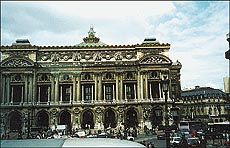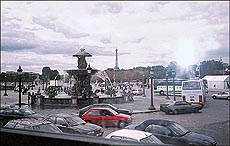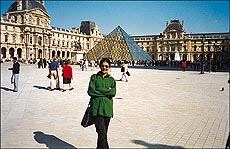










 










 
 
 
  |
Paris:
Charming, romantic and mysterious
By Kamaljit
Singh
HAVING heard the tales about the
beauty of Paris, I always longed to see the city.
Luckily, some time back I got a wonderful opportunity to
visit the dream city. While the plane was still hovering
over sprawling Charles de Gaulle Airport, the pilot
directed the attention of the passengers to a rare sight
of two aircraft landing on the same runway. After the
touchdown, in short time I was in the Cite
Universitaire by shelling out 300 francs as taxi
fare. It was a mistake on my part to travel by taxi as
Paris has a highly developed local train and bus
transport system. You can go to any place in the city by
the very efficient underground train called Metro or the
bus. The charges are quite low for one day tickets.
Passes of various durations are even more economical.
 However, to discover the numerous tourist
attractions in a short time, it is better to travel by
the Paris sightseeing bus which covers all the major
spots for just 125 francs per adult. A live commentary en
route takes one back to the times of historical evolution
of Paris. Believe me, once you see this jewel among
European cities, it is hard not to fall in love with its
many facets. The unbelievable architecture, beautiful
statues adorning the walls and pillars, and the layout of
Paris gives the feeling of moving in a fairyland. There
is romance in every nook and cranny. Elegant boulevards
with large chestnut trees are everywhere, and colorful
plantings of multi-hued flower beds enhance the beauty of
statues that adorn nearly every intersection. Further,
the woods and parks that encircle the city are restful
havens, ideal for strolling and sitting. However, to discover the numerous tourist
attractions in a short time, it is better to travel by
the Paris sightseeing bus which covers all the major
spots for just 125 francs per adult. A live commentary en
route takes one back to the times of historical evolution
of Paris. Believe me, once you see this jewel among
European cities, it is hard not to fall in love with its
many facets. The unbelievable architecture, beautiful
statues adorning the walls and pillars, and the layout of
Paris gives the feeling of moving in a fairyland. There
is romance in every nook and cranny. Elegant boulevards
with large chestnut trees are everywhere, and colorful
plantings of multi-hued flower beds enhance the beauty of
statues that adorn nearly every intersection. Further,
the woods and parks that encircle the city are restful
havens, ideal for strolling and sitting.
Getting Indian food in
Paris is not difficult at all. One Indian restaurant
Aarapana on Rue du Petit Pont is near the
historical cathedral of St. Notre Dames’ just across
the bridge over the Seine river. The tasting of typical
Indian food in Paris makes one feel at home, except when
you see some French persons having their dinner with hot samosas
on the side table! To taste French delicacies, there are
many French brasseries which are open all day and serve
any thing from snacks to traditional French provincial
no-frill cuisine. In the upmarket establishments, better
go in for set menu rather that selecting from a la carte.
This would make even such places affordable if you
are able to limit yourself to mineral water or cola.
The massive cathedral of
St. Notre Dame on an island in Seine was built from 1163
to 1330. The restoration was carried out in the middle of
the 19th century. The cathedral’s design, a Gothic
masterpiece, with its twin towers and richly sculpted
west front is kept closely to the original plan of Sully,
the bishop who ordered the construction. During the
Revolution, the statues of the monarchs on the facade
were destroyed by anti-royalists. They are now kept in
the national museum.
 Originally
a fishing village of the Parisii tribe on the
largest island on the Seine, Paris, arguably the most
beautiful city in the world, has a chequred history. The
main rulers who contributed to its development were
Philippe-Auguste in 12th century, Charles V in 14th
century, and Louis XIII, XIV, XV. But it was in the reign
of Louis XVI in the 18th century that Paris was
transformed completely. The demolition of all the houses
built on the bridges gave long views of the Seine as we
see it today. Napoleon I wanted to make it the most
beautiful city that could ever exist. He constructed not
only bridges, embankments, market halls, the Arc de
Tromphe of I’Etoile, the highways, and churches but
also a water supply system and numerous public fountains.
The last major changes before the 20th century were made
under Napoleon III. Then for the world fair of 1889 there
appeared an initially controversial, but later
celebrated, monument--the Eiffel Tower. Originally
a fishing village of the Parisii tribe on the
largest island on the Seine, Paris, arguably the most
beautiful city in the world, has a chequred history. The
main rulers who contributed to its development were
Philippe-Auguste in 12th century, Charles V in 14th
century, and Louis XIII, XIV, XV. But it was in the reign
of Louis XVI in the 18th century that Paris was
transformed completely. The demolition of all the houses
built on the bridges gave long views of the Seine as we
see it today. Napoleon I wanted to make it the most
beautiful city that could ever exist. He constructed not
only bridges, embankments, market halls, the Arc de
Tromphe of I’Etoile, the highways, and churches but
also a water supply system and numerous public fountains.
The last major changes before the 20th century were made
under Napoleon III. Then for the world fair of 1889 there
appeared an initially controversial, but later
celebrated, monument--the Eiffel Tower.
The work on this tower,
one of its kind in the world, began on January 26, 1887.
About 700 drawings were prepared to make parts of the
tower. These were assembled using 25,00,000 rivets and
the work progressed at an average of 15 metres per month.
Interestingly, despite weighing 10,000 tonnes, it exerts
the same pressure on the ground as a person seated in a
chair.
In order to reach the
first floor at 57 metres, 360 steps must be climbed, then
380 to reach the second at 155 metres, and another 1062
to reach the top at a height of 300 metres. Fortunately,
you can instead take the lifts installed shortly after
its construction. Built as a part of the exhibition, the
tower was to have been demolished at the end of the
concession obtained by Eiffel in 1909. It was saved by
radiotelegraphy and its military applications — the
interception of coded messages during the World War,
which most notably led to the arrest of the spy
Mata-Hari. Continuing its career on the airwaves, it was
improved in 1954 with television equipment that brought
its height to 320.75 m. Paris does not seem to have an
end when seen from top of the tower. You can measure the
distance from your home to the Eiffel Tower as the
distances to major cities of the world are written on the
four sides of the top floor.
Among the common tourist
spots, besides the Eiffel Tower, are Louvre Museum, Orsay
Museum Opera Galeries Lafayette, Grand Palais, Trocadero,
Champs Elysees Etoile, Bastille, Disneyland, Palace at
Versailles, etc. For conveniently seeing various museums,
passes of one to five days duration give admission to
seventy museums and sights in and around Paris. The world
renowned Louvre Museum can take up five to six days for
seeing every chamber in detail. It has an amazing
collection of 30,000 works of paintings , antiques,
sculptures and artefacts from all over the world. These
are divided into seven main collections, including both
antiquity and western art, from the Middle Ages to the
first part of the 19th century. Several temporary
exhibition areas and a section dedicated to the history
of the Louvre complete the permanent display. Leonardo de
Vinci’s Mona Lisa kept inside is a big crowd-puller.
With people jostling with each other, it becomes
difficult at times to click her in a proper frame.
 Just opposite the pyramid at the
entrance of Louvre is the Carrousel Square, a name given
by Louis XIV. The elegant triumphal arch here is an
imitation of Septimius Severus in Rome, built to the
glory of Napolean I’s victories in Italy. From here
begins the Gardens of the Tuileries, one of the largest
in Paris, with 2800 trees in 28 hectares. Besides its
lawns, it contains museums, making it a kind of open air
ante-chamber to Louvre. Running parallel is the rue de
Rivoli which was constructed on a commission from
Napolean Bonaparte. Beneath its arcades are many souvenir
shops, cafes and tea rooms for the delight of passers-by.
In the centre is Place des Pyramides where a statue of
Joan of Arc by Fremiet is a reminder that the heroine was
wounded on this site during an attack to deliver Paris in
1429. Just opposite the pyramid at the
entrance of Louvre is the Carrousel Square, a name given
by Louis XIV. The elegant triumphal arch here is an
imitation of Septimius Severus in Rome, built to the
glory of Napolean I’s victories in Italy. From here
begins the Gardens of the Tuileries, one of the largest
in Paris, with 2800 trees in 28 hectares. Besides its
lawns, it contains museums, making it a kind of open air
ante-chamber to Louvre. Running parallel is the rue de
Rivoli which was constructed on a commission from
Napolean Bonaparte. Beneath its arcades are many souvenir
shops, cafes and tea rooms for the delight of passers-by.
In the centre is Place des Pyramides where a statue of
Joan of Arc by Fremiet is a reminder that the heroine was
wounded on this site during an attack to deliver Paris in
1429.
As you leave Tuileries,
the Place de la Concorde, the largest square in Paris,
comes into view. It was here that King Louis XVI was
executed after the Revolution. Between the Rond-Pont and
the Place de la Concorde, the Avenue Champs-Elysees
becomes a place to stroll, as laid down by a royal decree
in 1667. Petit Palais and Grand Palais built for the
world fair are architectural wonders. Dominating the
avenue des Champs-Elysees, the Arc de Triomphe stands at
the centre of a perspective which starts at the Louvre
Palace and finishes at the Grande Arche. This work, some
50m high and 40m wide, was constructed by Napolean I and
is dedicated to the imperial armies. The design of India
Gate at New Delhi is said to have been adopted from this
Arc. The names of military generals who laid down their
lives are inscribed along with the victories. Nearby, on
the tomb of an unknown soldier, a flame burns which is
rekindled each evening. A triumphal way, a place for
strolling, or an obligatory route for Heads of State on
official visits, the Champs-Elysees is also the
prestigious shop-window of Paris. The buildings lining
the service roads include cinemas, luxury shops, cafes,
restaurants, banks, motor manufacturers and airlines vie
with each other in imagination to give the avenue its
glamour.
Not far away is the
Opera on Boulevard Hussman. A real architectural
masterpiece, the opera is sumptuously decorative. Raised
above a wide terrace with ten steps, seven fully arched
arcades flanked by sculpted groups, including la Danse,
it opens into the lobbies. Inside the building, a
profusion of materials, decoration and colour is to be
found. Legend has it that an underground river, la
Grande, flows beneath the Opera. The national academy of
music and dance is a place of wonder and marvels, full of
the passions expressed here — for art and life
— in a kind of temple, where the world finds itself
recreated through singing and dancing. Composers and
choreographers, instrumentalists and distinguished
singers and star dancers have performed here. The most
spectacular plots of a Romanesque world have been
unravelled on stage in the auditorium, adorned with the
finest worldly glories. In the corridors of this fabled
palace, the Cafe de la Paix’s terrace has served as
a host for the literary, artistic and political world.
While going from Grand
Palais to Hotel des Invalides, one crosses Seine by a
100-year-old, richly decorated bridge, Alexandre III, a
symbol of Franco- Russian friendship. This 40-metre wide
marvel supports, in the keystone of the vault of the
arch, two embossed copper front motifs — the arms of
Paris surrounded by Seine nymphs upstream, the arms of
Russia and the figure of La Neva surrounded by nymphs
downstream. At each end, two square pylons are surmounted
by gilded bronze equestrian groups symbolizing Pegasus
held by Fame.
Located in Marne-la
Valley, 32 km east of Paris, the Disneyland theme park is
a must for everyone visiting the city. You will find that
this magical world created by Walt Disney in an enchanted
setting with rides and attractions for everyone, A range
of refreshment stalls and restaurants ensure
visitors’ comfort, and for those lucky enough to be
staying longer, hotels offer accommodation with staff in
costume. An array of shops ensures that everyone can take
home a souvenir from their journey to the kingdom of
imagination. The park is mainly divided in five lands
with rides, attractions, food outlets and shops on a
particular theme. The themes are Main Street USA,
Frontier land, Adventure land, Fantasy land and Discovery
land.
Cabarets in Paris have
been a legend ever since Toulouse Lautrec immortalised
the can-can dancers of the Moulin Rouge. Enter any such
place and you will come across extraordinarily beautiful
girls, superb choreography and supporting acts of
puppeteers. However, non-smokers can have problem there
as the atmosphere becomes a bit thick in the evening.
Paris is a city of small
but speedy cars, just like our Chandigarh. Parisians
drive on the right side of the road. Often, the motorists
will not mind jumping the red light at less crowded
crossings. So one has to be extra alert while crossing on
foot. Beggary is not a rare phenomenon at most of the
public places like the Eiffel Tower, major railway
stations like Gyre de Lyon, even as the city authorities
have often taken measures to curb it. Pickpockets also
operate as in case of every other city. Therefore, always
take care of your purse and other belongings.
Wherever you are staying
in Paris, the fascinating stores are always within the
easy reach. Shopping is not necessarily expensive though
many stores may be beyond the reach of visitor from South
Asia. Purchasing French perfumes and cosmetics there,
unless you need a particular brand,is not a sound
preposition in the age of liberalisation as you can get
them at home at a lower price.
Knowing functional
French is an advantage as a majority of the Parisians do
not know English. There are certain things about which
they are very particular. Be polite to every one and
formally wish the person occupying any counter at public
places before you ask for any thing.
The more you explore it,
the more you fall in love with Paris, it’s like a
charming, beautiful woman — alluring, mysterious and
always at the back of your mind when you are at home.
|

